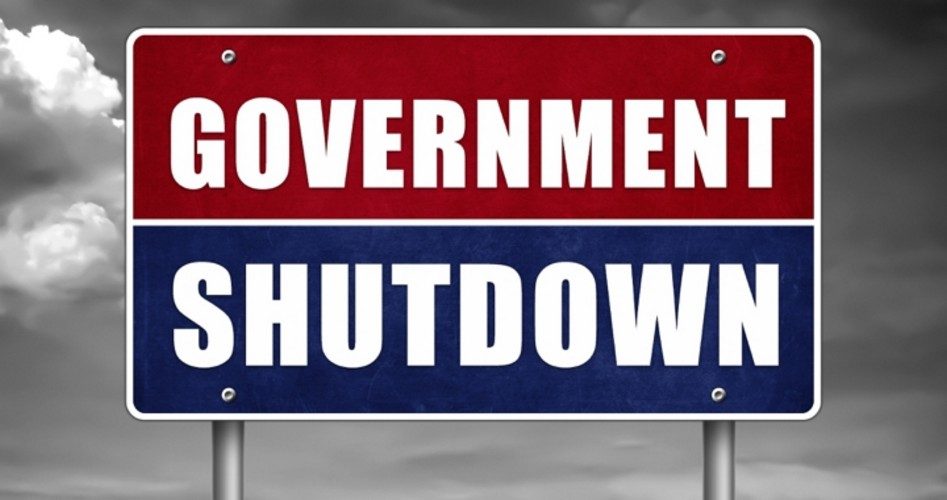
If the government shut down and no one reported it, would most of us notice? The current government “shutdown” is the 19th in American history, yet the Earth still turns on its axis, the seas still rise and fall, the seasons still come and go — and Uncle Sam still owns possibly the largest government in world history.
Shutdowns, of course, result when Congress doesn’t approve a budget for the upcoming fiscal year, or when the president and Congress cannot agree on a budget and the latter doesn’t have enough votes to override a presidential veto. The consequences are that “nonessential services” are suspended and nonessential employees furloughed. “Nonessential,” mind you, is the category into which most federal employees fall.
If the current so-called “shutdown” doesn’t run into Monday, however, it will be what Marc Goldwein, senior policy director of the Committee for a Responsible Federal Budget, calls a “fake shutdown.” Goldwein would thus dub it because nonessential government services are shutdown over the weekend, anyway.
Then there’s the fake news. The mainstream media love portraying shutdowns as being the fault of Republicans, in accordance with the wishes of their public-relations clients, the Democrats. House Democratic Leader Nancy Pelosi well epitomizes this spin, having just announced, “Happy anniversary, Mr. President…. You wanted a shutdown. The shutdown is all yours.” This is what you call, objectively speaking in a bipartisan spirit, a lie.
Breaking a Democrat Senate filibuster requires 60 votes, a threshold that cannot be met without Democrat support. The bottom line with shutdowns is that it takes two to tango. Being the result of disagreement between the two parties, the relevant question always is: What are they currently disagreeing about?
The current issue is that, as pundit Tucker Carlson has put it, the Democrats (and some Republicans) consider a renewed amnesty for illegal aliens so important that they’re willing to shut down American citizens’ government over it. Many in the GOP oppose this red carpet for the illegals in question, known as DACA recipients.
Of course, the Democrats care about this issue deeply; after all, upwards of 80 percent of these illegals would vote Democrat after naturalization, a phenomenon that could flip four or five Republican-leaning states to the Democrats, according to one study. Perhaps the DACA acronym should stand for Democrat Annihilation of Conservative America.
The shutdown, in contrast, wouldn’t annihilate anything. But it would have some effects. As Fox News reports, “For example, those who work at national parks, monuments and museums would be told to go home.” And “Americans will still be able to get their Social Security and Medicare benefits and food stamps. However, people expecting VA benefits, unemployment benefits, farm subsidies and tax refunds may experience delays.” More egregiously, military members wouldn’t receive their pay until the shutdown ended.
The worst part of a shut down, says the aforementioned Goldwein, is that they “‘waste money’ more than they ‘cost money,’” reports Fox. “Instead of paying employees to work, we’re paying them not to work,” he says. Of course, some would say we normally pay many government employees not to work.
Actually, though, this is only the second-worst part of a shutdown, if CNN is to be believed. The network warns that since NASA’s asteroid monitoring system will be paused, we run the risk of “an undetected asteroid strike,” as Grabienews relates it. Yes, well, I suppose then we wouldn’t have time to flee to the nearest habitable alien planet or settle our affairs — such as deciding what to bequeath our remaining worldly possessions to, the surviving post-apocalyptic bacteria or cockroaches.
Really, though, the worst aspect of the government-shutdown issue is that it doesn’t involve a metaphorical asteroid strike on what should be made extinct. For example, we could permanently shut down unconstitutional federal bureaucracies such as the Department of Education, the Equal Employment Opportunity Commission, the Department of Health and Human Services, and the Environmental Protection Agency (states have their own environmental protection agencies).
We could also learn from Texas, whose legislature meets only once every two years. We often hear complaints about a “do-nothing Congress,” but we certainly need a do-little Congress. After all, what does Congress “do”? Well, when Ford, Apple, or General Mills is more productive, we get more, respectively, cars, electronic devices, or food. And Congress?
It produces laws, regulations and mandates.
By definition, these generally are removals of freedom since they state there’s something you must or must not do. Congress also may create new government bureaucracies, which consume resources and often, via bureaucratic fiat, stifle freedom further.
Moreover, the recent tax cut aside, Congress is quite adept at increasing taxes and fleecing the people.
Of course, Congress could conceivably work to increase freedom, but this rarely happens. For there’s at least one great exception to the age-old rule that it’s easier to destroy than create: big-government laws, programs, and bureaus.
Another exception, apparently, is politicians’ willingness to sell out their country for votes — even for “foreign” votes.
Photo: gguy44/iStock/Getty Images Plus



